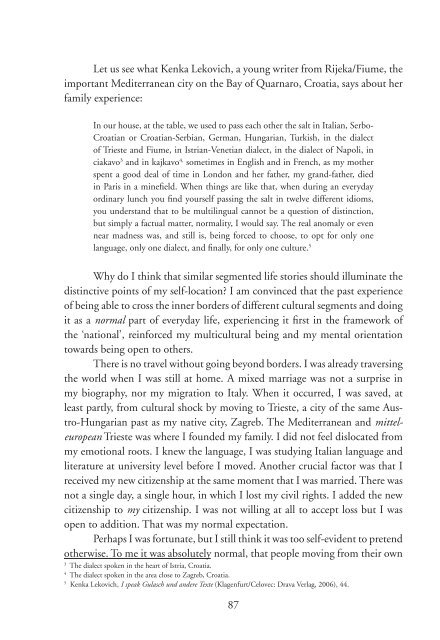Teaching Subjectivity. Travelling Selves for Feminist ... - MailChimp
Teaching Subjectivity. Travelling Selves for Feminist ... - MailChimp
Teaching Subjectivity. Travelling Selves for Feminist ... - MailChimp
Create successful ePaper yourself
Turn your PDF publications into a flip-book with our unique Google optimized e-Paper software.
Let us see what Kenka Lekovich, a young writer from Rijeka/Fiume, the<br />
important Mediterranean city on the Bay of Quarnaro, Croatia, says about her<br />
family experience:<br />
In our house, at the table, we used to pass each other the salt in Italian, Serbo-<br />
Croatian or Croatian-Serbian, German, Hungarian, Turkish, in the dialect<br />
of Trieste and Fiume, in Istrian-Venetian dialect, in the dialect of Napoli, in<br />
ciakavo 3 and in kajkavo 4, sometimes in English and in French, as my mother<br />
spent a good deal of time in London and her father, my grand-father, died<br />
in Paris in a minefield. When things are like that, when during an everyday<br />
ordinary lunch you find yourself passing the salt in twelve different idioms,<br />
you understand that to be multilingual cannot be a question of distinction,<br />
but simply a factual matter, normality, I would say. The real anomaly or even<br />
near madness was, and still is, being <strong>for</strong>ced to choose, to opt <strong>for</strong> only one<br />
language, only one dialect, and finally, <strong>for</strong> only one culture. 5<br />
Why do I think that similar segmented life stories should illuminate the<br />
distinctive points of my self-location? I am convinced that the past experience<br />
of being able to cross the inner borders of different cultural segments and doing<br />
it as a normal part of everyday life, experiencing it first in the framework of<br />
the ‘national’, rein<strong>for</strong>ced my multicultural being and my mental orientation<br />
towards being open to others.<br />
There is no travel without going beyond borders. I was already traversing<br />
the world when I was still at home. A mixed marriage was not a surprise in<br />
my biography, nor my migration to Italy. When it occurred, I was saved, at<br />
least partly, from cultural shock by moving to Trieste, a city of the same Austro-Hungarian<br />
past as my native city, Zagreb. The Mediterranean and mitteleuropean<br />
Trieste was where I founded my family. I did not feel dislocated from<br />
my emotional roots. I knew the language, I was studying Italian language and<br />
literature at university level be<strong>for</strong>e I moved. Another crucial factor was that I<br />
received my new citizenship at the same moment that I was married. There was<br />
not a single day, a single hour, in which I lost my civil rights. I added the new<br />
citizenship to my citizenship. I was not willing at all to accept loss but I was<br />
open to addition. That was my normal expectation.<br />
Perhaps I was <strong>for</strong>tunate, but I still think it was too self-evident to pretend<br />
otherwise. To me it was absolutely normal, that people moving from their own<br />
3<br />
The dialect spoken in the heart of Istria, Croatia.<br />
4<br />
The dialect spoken in the area close to Zagreb, Croatia.<br />
5<br />
Kenka Lekovich, I speak Gulasch und andere Texte (Klagenfurt/Celovec: Drava Verlag, 2006), 44.<br />
87

















